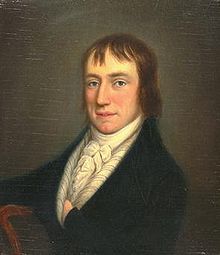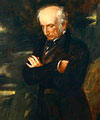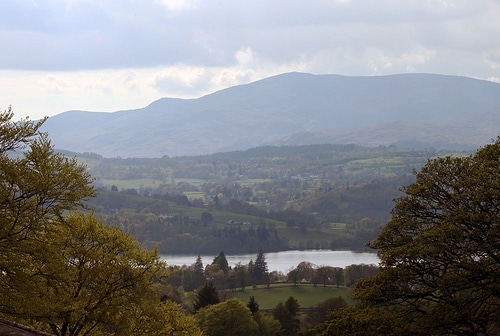William Wordsworth (1770-1850) was a major Romantic poet, based in the Lake District, England. His greatest work was “The Prelude” – dedicated to Samuel Taylor Coleridge. The Prelude is a spiritual autobiography based on Wordsworth’s travels through Europe and his observations of life. His poetry also takes inspiration from the beauty of nature, especially his native Lake District.
Early life – William Wordsworth
Wordsworth was born on 7 April 1770 in Cockermouth, in north-west England. His father, John Wordsworth, introduced the young William to the great poetry of Milton and Shakespeare, but he was frequently absent during William’s childhood. Instead, Wordsworth was brought up by his mother’s parents in Penrith, but this was not a happy period. He frequently felt in conflict with his relations and at times contemplated ending his life. However, as a child, he developed a great love of nature, spending many hours walking in the fells of the Lake District. He also became very close to his sister, Dorothy, who would later become a poet in her own right.
In 1778, William was sent to Hawkshead Grammar School in Lancashire; this separated him from his beloved sister for nearly nine years. In 1787, he entered St. John’s College, Cambridge. It was in this year that he had his first published work, a sonnet in the European Magazine. While still a student at Cambridge, in 1790, he travelled to revolutionary France. He was deeply impressed by the revolutionary spirit and the principles of liberty and egalite. He also fell in love with a French woman, Annette Vallon; together they had an illegitimate daughter, Anne Caroline.
France
 After graduating from Cambridge, Wordsworth returned to France, where his daughter was born in 1792. However, despite expressing a desire to marry, Wordsworth left France alone, leaving his partner and daughter in France. At the time, there was growing political tension between France and Great Britain. Also, Wordsworth became increasingly estranged from the French Revolution; in the Reign of Terror, he saw the revolutionary principles betrayed. Wordsworth was unable to return to France until 1802 when the political situation improved. Wordsworth later sought to maintain his financial obligations to his daughter, but also kept his illegitimate daughter hidden from the public gaze.
After graduating from Cambridge, Wordsworth returned to France, where his daughter was born in 1792. However, despite expressing a desire to marry, Wordsworth left France alone, leaving his partner and daughter in France. At the time, there was growing political tension between France and Great Britain. Also, Wordsworth became increasingly estranged from the French Revolution; in the Reign of Terror, he saw the revolutionary principles betrayed. Wordsworth was unable to return to France until 1802 when the political situation improved. Wordsworth later sought to maintain his financial obligations to his daughter, but also kept his illegitimate daughter hidden from the public gaze.
Friendship with Samuel Taylor Coleridge
After graduating, Wordsworth was fortunate to receive a legacy of £900 from Raisley Calvert to pursue a career in literature. He was able to publish his first collection of poems, An Evening Walk and Descriptive Sketches. That year he was also to meet Samuel Taylor Coleridge in Somerset. They became close friends and collaborated on poetic ideas. They later published a joint work – Lyrical Ballards (1798), and Wordsworth greatest work ‘The Prelude‘ was initially called by Wordsworth ‘To Coleridge‘
This period was important for Wordsworth and also the direction of English poetry. With Coleridge, Keats and Shelley, Wordsworth helped create a much more spontaneous and emotional poetry. It sought to depict the beauty of nature and the quintessential depth of human emotion. In the preface to Lyrical Ballards, Wordsworth writes of poetry:
“The spontaneous overflow of powerful feelings: it takes its origin from emotion recollected in tranquility.”
Lyrical Ballards includes some of his best-known poems, such as, “Lines Composed a Few Miles above Tintern Abbey”, “A Slumber Did my Spirit Seal”.
A SLUMBER did my spirit seal;
I had no human fears:
She seemed a thing that could not feel
The touch of earthly years.
No motion has she now, no force;
She neither hears nor sees;
Rolled round in earth’s diurnal course,
With rocks, and stones, and trees.
– W. Wordsworth 1799.
In 1802, after returning from a brief visit to see his daughter, Wordsworth married a childhood friend, Mary Hutchinson. Dorothy continued to live with the couple, and she became close to Mary as well as her brother. William and Mary had five children, though three died early.
Lake District, North Windermere, near Grasmere
In 1807, he published another important volume of poetry “Poems, in Two Volumes“, this included famous poems such as; “I Wandered Lonely as a Cloud”, “My Heart Leaps Up”, “Ode: Intimations of Immortality.”
I wandered lonely as a cloud
That floats on high o’er vales and hills,
When all at once I saw a crowd,
A host, of golden daffodils;
– W. Wordsworth – I Wandered Lonely as a Cloud
In 1813, he received an appointment as Distributor of Stamps for Westmorland; this annual income of £400 gave him greater financial security and enabled him to devote his spare time to poetry. In 1813, he family also moved into Rydal Mount, Grasmere; a picturesque location, which inspired his later poetry.
“My heart leaps up when I behold
A rainbow in the sky:
So was it when my life began;
So is it now I am a man;
So be it when I shall grow old,
Or let me die!”
(1802)
Poet Laureate
By the 1820s, the critical acclaim for Wordsworth was growing, though ironically critics note that, from this period, his poetry began losing some of its vigour and emotional intensity. His poetry was perhaps a reflection of his own ideas. The 1790s had been a period of emotional turmoil and faith in the revolutionary ideal. Towards the end of his life, his disillusionment with the French Revolution had made him more conservative in outlook. In 1839 he received an honorary degree from Oxford University and received a civil pension of £300 a year from the government. In 1843, he was persuaded to become the nation’s Poet Laureate, despite saying he wouldn’t write any poetry as Poet Laureate. Wordsworth is the only Poet Laureate who never wrote poetry during his official time in the job.
Wordsworth died of pleurisy on 23 April 1850. He was buried in St Oswald’s church Grasmere. After his death, his widow Mary published his autobiographical ‘Poem to Coleridge’ under the title “The Prelude”.





No comments:
Post a Comment